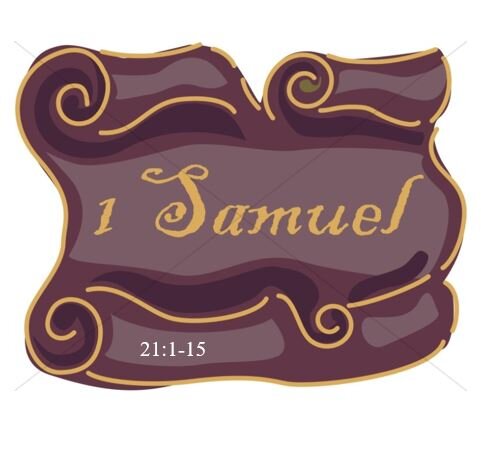BIG IDEA:
WHEN WE LOSE FOCUS ON GOD’S POWER TO PROTECT US WE RESORT TO DESPERATE MEASURES TO SAVE OUR OWN SKIN WITHOUT REGARD TO:
– THE IMAPCT ON THE WELL BEING OF OTHERS
– THE IMPACT ON OUR TESTIMONY FOR THE LORD
INTRODUCTION:
Sad chapter in the history of God’s Anointed;
Most places we see David portrayed in a very noble light
I. (:1-9) DECEPTION PUTS AHIMELECH AT RISK (AND THE PRIESTS)
A. (:1-2) Seeking Assistance Under False Pretenses
1. (:1) Ahimelech Smells Trouble
“Ahimelech came trembling to meet David”
Roe: “How does it look to Ahimelech? Here is the leader of the armies of Saul, and he is alone. It is a Sabbath. The ‘Law’ forbids travel on the Sabbath. David never traveled alone. He traveled with an army, or at least a band of bodyguards. Ahimelech, knowing the kind of conflict going on 5 miles north, is sure to wonder what is happening. David, knowing Ahimelech probably understands the conflict in the palace and fearful that Ahimelech will not provide his needs, lies to him.”
2. (:2) David Fails to Come Clean and Admit the Truth
“The king has commissioned me with a matter”
Probably not a very convincing tale … but Ahimelech leaves it at that and does not press for any details.
B. (:3-6) Seeking Provisions – the consecrated bread
1. (:3) Desperate Request
“Give me . . . whatever can be found”
No time to be picky
No time for pleasantries
2. (:4) Spiritual Dilemma
Only consecrated bread available
Certain special conditions must be met
Roe: This was the “bread of the Presence,” the twelve loaves that were baked every week on the Sabbath, brought into the tabernacle, into the Holy Place, laid on the table, six loaves in each portion, each loaf representing a tribe of Israel. Each loaf was dedicated to God. They sat there the full seven days, and were sanctified to God. They indicated God was the total provider for all the needs of Israel. At the end of seven days, 12 fresh loaves were brought in to replace the twelve loaves on the table. The high priest, and the priests of the nation of Israel, could eat those loaves which were replaced. They were set apart for the use of the priests but could be eaten only in the Holy Place. So all Ahimelech had was consecrated bread, bread that had come right off the table of the Lord.
3. (:5) Holiness is Not the Issue
4. (:6) Compliance on the Part of Ahimelech –
“so the priest gave him consecrated bread”
putting physical needs above ceremonial regulations (Matt. 12:3-4)
C. (:7) Deception Discovered – Doeg the Edomite
Roe: Why does God give David a view of Doeg the Edomite, the compromiser, the fellow who lives by his wits, by his deceit, by expediency, chief of Saul’s shepherds, “big man on campus” back at Gibeah of Saul? Why right here? David knows Doeg will go back and tell Saul. What position did David put Ahimelech in? Saul is a mad man, remember. He is going to keep the reins of government no matter what YHWH wants, and should YHWH’s anointed king, David, get in his way, David dies. Saul is about to embark upon a campaign that destroys Israel in order to destroy David, and David knows that. What do you think goes through David’s mind about the chances of Ahimelech coming out of this unscathed? He is assuredly going to get hurt. How much does David care about that? David has now focused totally on himself, “Nobody has it as bad as I do. These are legitimate needs.” God deliberately, at this point in time when David first starts his deceit, brings him Doeg, and he has a chance, therefore, to come clean so the right report gets back to Saul. [David admits later on that he knew Doeg would go and tell Saul.] But what does he do? Well, he is too focused on self and cares little about Ahimelech. When you are focused on self, you do not care about anybody else. It is just “My needs. My problems.”
Ryrie: “Doeg was detained at the sanctuary at Nob because of a vow, a need for cleansing, or because he was suspected of leprosy (Lev. 13:4).”
D. (:8-9) Seeking Protection – the sword of Goliath
1. (:8) Desperate Need – no weapons
“I brought neither my sword nor my weapons with me”
2. (:9) Unique Weapon – sword of Goliath
“There is none like it”
I. (:10-15) DECEPTION OF INSANITY BEFORE ACHISH (KING OF GATH)
(first instance of defense strategy of pleading insanity)
A. (:10) Trying to Keep a Low Profile
(cf. Witness Protection Program – new identity in land of Philistines)
trying to blend in … avoid detection
(difficult to do with sword of Goliath attracting attention)
B. (:11) Discovered to be both Infamous and a Dangerous Threat
“Is this not David the king of the land?”
Too famous to fly under the radar
C. (:12-13) Brilliant Deception Inspired by Fear
“So he disguised his sanity before them, and acted insanely in their hands”
Taking tremendous risk
D. (:14-15) Escaping as a Harmless Madman

